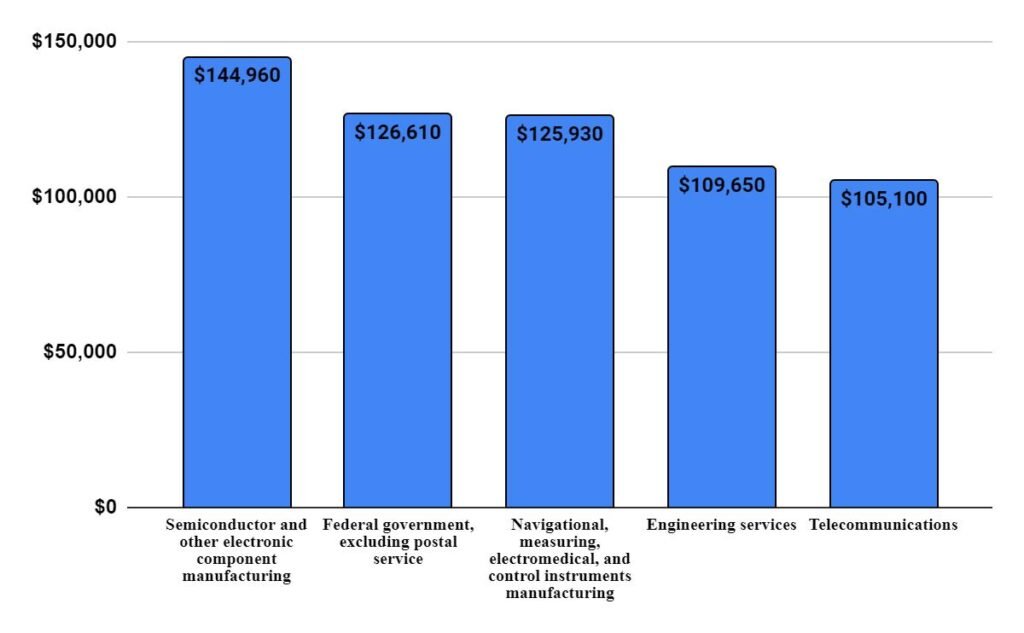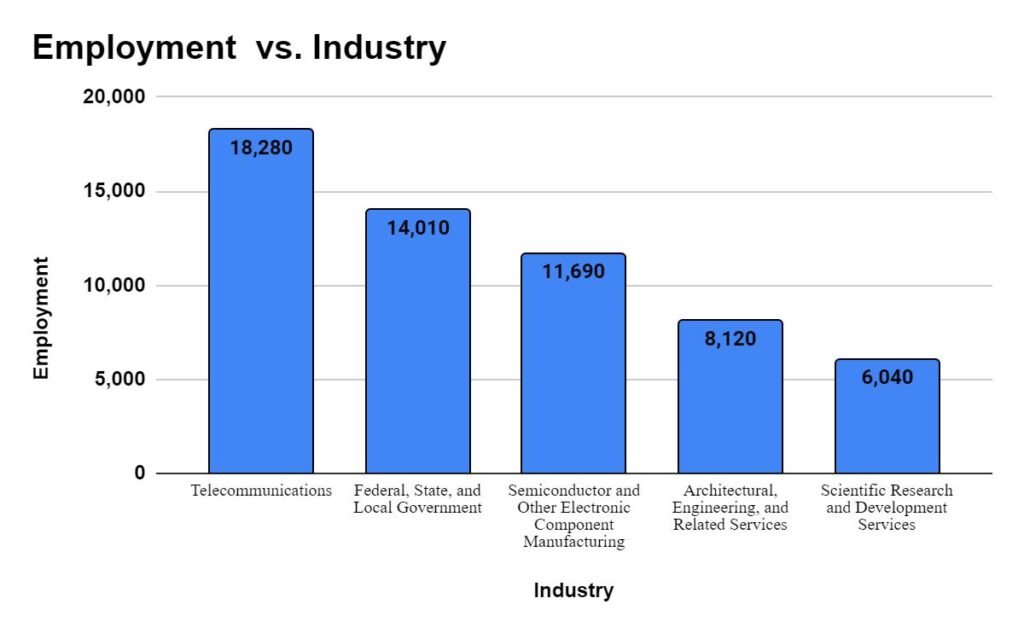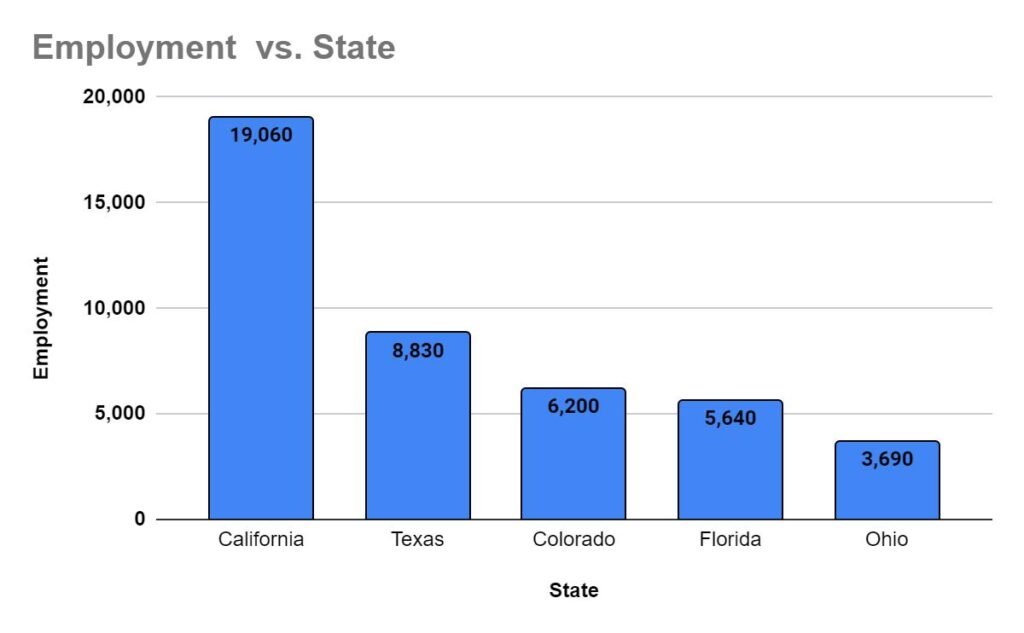Electronics Engineers are the expert behind the gadgets and devices we use on every day. But what kind of financial rewards can you expect in this dynamic and ever-evolving field? Let’s plug into the world of Electronics Engineer salaries in the USA.
This article explores the Electronics Engineers wages in United States Of America, exploring the factors that influence your earning potential and offering tips to maximize income in this dynamic field.
Defining the Electronics Engineers:
Electronics Engineers create innovative solutions that drive technological progress. The primary responsibilities of Electronics Engineers encompass:
- Circuit Design and Development
- Embedded Systems Engineering
- Develop Signal Processing and Communication Systems
- Conduct Testing and Quality Assurance
- Research and Innovation
- Project Management and Collaboration

- Electronics Engineers Salary Range
- Top Paying Industries for Electronics Engineers
- Top Paying U.S. States for Electronics Engineers
- Electronics Engineers Take-Home Pay
- Expenses and Savings Potential Estimates in USA
- Beyond the Base Salary
- Factors Affecting Electronics Engineers Income
- Boosting Electronics Engineers Salary: Skills and Tips
Electronics Engineers Salary Range
According to the U.S. Bureau of Labor Statistics1, the annual median salary for Electronics Engineers is $119,200. Electronics Engineers earn salaries ranging from $76,700 to $179,690 annually.
Top 10% earners: Exceed $179,690 annually
Bottom 10% earners: Make less than $76,700 annually
Projected annual median salary for PST in 2024-2025 (with 2.5% increase) is $122,180.
The median annual wages for Electronics Engineers in the Top industries

Chart 1: Median annual wages for Electronics Engineers in the top industries (U.S. BLS May 20232)
This wide range highlights the diverse factors that influence a Electronics Engineers income in USA. We will be discussing those factors below.
Top Paying Industries for Electronics Engineers
The U.S. Bureau of Labor Statistics (BLS) data reveals that Electronics Engineers working for Petroleum and Coal Products Manufacturing earn the highest annual salaries, exceeding $ 154,000 annually (U.S BLS May 20233).
Other high-paying industries in USA includes Semiconductor and Other Electronic Component Manufacturing etc.
| Industry | Hourly mean wage | Annual mean wage |
| Petroleum and Coal Products Manufacturing | $ 74.40 | $ 154,740 |
| Semiconductor and Other Electronic Component Manufacturing | $ 71.38 | $ 148,460 |
| Scientific Research and Development Services | $ 70.83 | $ 147,320 |
| Aerospace Product and Parts Manufacturing | $ 65.87 | $ 137,020 |
| Computer and Peripheral Equipment Manufacturing | $ 65.79 | $ 136,830 |
Industry with highest Employment Level for Electronics Engineers
Most number of Electronics Engineers are employed in Credit Telecommunications, followed by Federal, State, and Local Government, (excluding State and Local Government Schools and Hospitals and the U.S. Postal Service).

Chart 2: Industry with highest employment level for Electronics Engineers
Top Paying U.S. States for Electronics Engineers
California leads the pack with the highest annual mean wage for Electronics Engineers in USA. Following closely are District of Columbia and Maryland all offering wages exceeding $150,000 annually (U.S BLS4).
| Top Paying States | ||
| State | Hourly mean wage | Annual mean wage |
| California | $ 72.35 | $ 150,490 |
| District of Columbia | $ 70.55 | $ 146,740 |
| Maryland | $ 67.55 | $ 140,500 |
| New Jersey | $ 67.19 | $ 139,750 |
| Maine | $ 65.47 | $ 136,170 |
| Other States | ||
| Texas | $ 59.13 | $ 122,990 |
| Colorado | $ 61.67 | $ 128,270 |
| Florida | $ 57.11 | $ 118,790 |
| Ohio | $ 52.26 | $ 108,690 |
| Rhode Island | $ 60.87 | $ 126,610 |
| Arizona | $ 58.49 | $ 121,660 |
U.S. States with the highest employment level for Electronics Engineers
California leads in providing employment to the Electronics Engineers, followed by Texas and Colorado.

Chart 3: States with the highest employment level for Electronics Engineers
Electronics Engineers Take-Home Pay
After factoring in federal and state taxes, a Electronics Engineers with a state-wise annual mean salary, would have an estimated net income as follows:
Taxes and take home pay estimate for a single filer
Colorado: $128,270 (Annual mean wage) – $25,935 (Estimated income tax) = $102,335 (Estimated take home pay).
California: $150,490 (Annual mean wage) –$36,446 (Estimated income tax) = $114,044 (Estimated take home pay).
Texas: $122,990 (Annual mean wage) – $19,593 (Estimated income tax) = $103,397 (Estimated take home pay).
More taxes can be saved by contributions in IRA, retirement, itemized deduction such as charitable contributions, medical and dental expenses.
Expenses and Savings Potential Estimates in USA
The average annual expenses for a single person household in California are estimated at $48,163 excluding taxes, according to estimates from the Massachusetts Institute of Technology5. (The figures are measured in 2023 inflation-adjusted dollars)
Based on this estimate, a Electronics Engineers earning the take home pay of $114,044, with basic expenses could potentially save $38,521 annually.
It’s important to note that individual expenses can vary significantly depending on lifestyle choices and location.
Savings for Married Couples/Households:
While the data provided doesn’t explicitly detail salary savings for married couples or households, it’s important to consider that combined incomes and potentially shared expenses could significantly increase overall savings potential in USA.
Beyond the Base Salary
Total compensation for Electronics Engineers goes beyond the hourly or annual wage. Organizations offer additional benefits such as:
Housing stipends: Provides financial support for housing during your placement.
Meal stipends: To help with daily meals.
Travel allowances: To reimburse travel expenses incurred during relocation.
Health insurance: Comprehensive health insurance coverage for you and your dependents.
Paid time off: Vacation days and sick leave.
Childcare assistance: Childcare assistance programs help employees manage this significant expense.
Life insurance: This benefit provides financial protection for an employees family in the event of their death.
Disability insurance: This benefit provides income to an employee who is unable to work due to a disability.
Continuing education reimbursement: Support for professional development and training.
Retirement savings plans: Retirement planning gets a helping hand with employer-sponsored plans like 401(k)s. These plans offer tax advantages for saving. Employers may also match employee contributions.
Factors Affecting Electronics Engineers Income
Several factors can affect Electronics Engineers paycheck:
Experience: As with most professions, experience plays a significant role in determining salary. Entry-level specialists can expect lower salaries, while seasoned professionals with proven track records command higher compensation.
Education and Certifications: Master’s or Ph.D., which can significantly enhance an Electronics Engineer’s earning potential. Additionally, professional certifications and specializations in areas like embedded systems, signal processing, or VLSI design can further increase their marketability and income prospects.
Location: Geographic location significantly impacts Electronics Engineers salaries. U.S. States like California, District of Columbia, and Maryland offer some of the highest pay, while others may offer lower wages.
Industry: The industry you work in can impact your salary. Petroleum and Coal Products Manufacturing generally offer the highest wages.
Employer: Working for a larger corporations and high-tech sectors might offer higher compensation packages compared to smaller firms.
Contract Details: The specific terms of the employment contract, including factors like housing stipends, overtime pay, and benefits, can affect the overall compensation package.
Boosting Electronics Engineers Salary: Skills and Tips
So, how can Electronics Engineers maximize their salary? Here are some tips:
Skills and Certifications: Those with expertise in niche or emerging technologies, such as artificial intelligence, robotics, or quantum computing, and also develop strong project management skills, including planning, budgeting, and risk management can leverage their specialized knowledge to negotiate higher compensation.
Negotiate Your Salary: Don’t be afraid to negotiate your salary during the job offer stage. Research market rates for Electronics Engineers with your experience and qualifications.
Take on Leadership Roles: Electronics Engineers who take on managerial or leadership roles, overseeing teams and directing complex projects, often receive higher salaries commensurate with their increased responsibilities and decision-making authority.
Continue Learning: Stay up-to-date with the latest advancements in your field by attending conferences and pursuing training opportunities.
Conclusion:
A career as a Electronics Engineers in United States offers both professional satisfaction and the potential for a high salary. By understanding the various factors that influence salary and carefully managing expenses, Electronics Engineers can make informed decisions and pave the way for a rewarding and financially secure career path.
Share this Post
Note:
This article provides general information only and should not be considered financial advice: Your individual circumstances and specific job offer details will significantly impact your actual earnings.
Seek professional guidance: Consulting with a financial advisor can provide personalized advice on managing your finances and maximizing your savings potential.
Sources
- U.S. Bureau of Labor Statistics: https://www.bls.gov/oes/current/oes172072.htm#st ↩︎
- U.S. BLS May 2023: https://www.bls.gov/ooh/architecture-and-engineering/electrical-and-electronics-engineers.htm#tab-5 ↩︎
- U.S. BLS: https://www.bls.gov/oes/current/oes172072.htm#st ↩︎
- U.S. BLS: https://www.bls.gov/oes/current/oes172072.htm#st ↩︎
- Massachusetts Institute of Technology: https://livingwage.mit.edu/states/06 ↩︎

